Tracy
Forum Replies Created
-
AuthorReplies
-
The obvious place to start with investigations into the history of the Morticians Guild was to question Rufus. But first she needed to think. Truella made her way to her room, and locked the door. At least now that Eris was back so soon, Truella was free to let Eris get on with whatever she was doing. After lowering the blinds at the windows, she lay back on the bed and closed her eyes. As she started to drift off to sleep, an imaginary conversation ran through her head.
Rufus: “The Morticians’ Guild, originally known as the ‘Necro-Keepers,’ trace their lineage back to ancient Egypt. They were the guardians of rites that ensured the safe passage of souls to the afterlife. Over millennia, they adapted and evolved, absorbing arcane knowledge from various cultures—the Greeks with their Eleusinian Mysteries, the Romans with their burial rites, even the Celtic traditions of Samhain.”
Truella: “That’s fascinating. So, this ancient craft has been handed down through generations?”
Rufus: “Precisely. While Hildegarde von Bingen brought enlightenment and medicinal wisdom to her nuns in the 12th century, the Morticians’ practices were already etched in the annals of history. They operated in silence, often in the shadows, perfecting the skills of embalming, necromancy, and spirit communication.”
Truella: “And what about their presence here, in this coven merger?”
Rufus: “We’ve been called upon at times of great need, when balance must be maintained between the living and the dead. Our presence here isn’t coincidental. The dragons and ancient spirits awaken, and we, the keepers, ensure that not all realms collide irreversibly.”
Truella: “So, would you say the Guild has played a role in significant historical events?”
Rufus: “Indeed. We’ve been the unsung heroes, the silent watchers. From plagues to wars, ensuring the dead find peace and don’t linger to disrupt the world of the living. Our methods may have modernized, but our core purpose remains unchanged. The knowledge, the rituals—they are our legacy.”
Truella: “Thank you, Rufus. That’s more fascinating than a year’s worth of ancient spellbooks.”
Rufus: “You’re welcome, Truella. Just remember, history isn’t merely dates and names; it’s living through us, weaving its magic continuously.”
Of course! A fleeting flash of illumination lit Truella’s eyes. That’s it!
“Thick, yes, deaf, oh! That’s too funny, and the middle ages…. Hildegarde….too late, all too late, it can’t be the nuns! Don’t you see, Eris?” Truella cackled wildly. “We can rule the nuns out!”
“We can?” Eris was baffled. What had suddenly come over Truella?
“We can’t rule the morticians out yet though, What do we know about their background?”
“Not much,” admitted Eris. “But why are we ruling the nuns out? Ruling them out of what?”
“Because they are not connected to this place. They’re not old enough.”
“Well, that’s as clear as mud,” Jeezel said, expecting Truella to explain what she was talking about, but Truella had wandered off saying she needed to think.
“Why has Frella gone so soon?” asked Truella, when the beastly morality prayers were finished. “She was supposed to accompany us down the cellars tonight. I tell you what,” Truella rubbed her eyes and pushed her hair back, “This has been the longest day I’ve ever known. And it’s not over yet. Maybe we should leave the exploration of the cellars until tomorrow night.”
“Suits me,” said Zeezel, “I didn’t want to go down there anyway. The thought of going down there would ruin my evening, and I’ve got a gorgeous little cocktail dress picked out for tonight.”
“Jeezel, ” Eris said warningly, “We’re here on business.”
“Oh, lighten up, Eris! None of us even knows what we’re really here for! One minute it’s a boring merger or even a takeover, the next minute it’s all cloak and dagger mystery, then it’s a morality play, what’s it gonna be next?”
“A Barbara Cartland novel? Or 50 shades of undertakers?” Eris said with scowl.
“You don’t want to go down the cellar either, do you, Eris?” Truella asked, knowing the answer. “Never mind. You go and say some more prayers with Audrey. Jez, enjoy your evening to the hilt,” Truella wiggled her eyebrows. “I’ll go on my own.”
The others looked at her open mouthed. “You can’t be serious!”
“She isn’t going on her own,” Eric said darkly.
“I don’t know what you mean,” Truella pretended innocence. Of course she wasn’t going on her own. Rufus would go with her, and she even had an idea to invite Sassafras and Sandra. “Oh, alright then, I won’t go,” she lied. ” I’ll wait for you and we’ll go tomorrow night. But only if Frella comes back so she can come with us.”
Eris wasn’t stupid, she knew exactly what Truella was planning. She had to rein Truella in, but how? Suddenly, inspiration struck.
“We’d better go and get ready for dinner,” Eris said, “See you all later in the dining hall.” And with that she stalked out of the room.
As soon as she was out of the door, Eris sprinted up the hallway. She had to get to him before Truella got there. Crashing into Brother Bartolo as she careered round a corner, she apologised hurriedly and asked if he knew where Rufus was. Bartolo informed her that he’d seen Rufus by the fountain. Eris resisted the temptation to remark snidely about him needing to cool down.
He was still there when Eris reached the courtyard, sitting on the side of the water feature, trailing his hand in the water and looking gloweringly pensive. Eris took a deep breath.
“Mind if I join you?” she asked pleasantly, sitting down beside him. “We’re so grateful to you guys for coming to help us out, it’s all quite a lot for us to take in, you know?” Eris smiled disarmingly. “We’d feel so much better if Frella was here with us. We did manage to get her here, but something went wrong and she didn’t stay as long as we hoped she would. She’s on a mission in Ireland, and couldn’t come over, but Sister Audrey kindly offered to let Frella posess her for 24 hours, and then I don’t know what happened but Frella was called back abruptly to her own body.” Eris knew she was garbling semi incoherently, which was most unlike her normally, but she thought this approach would appeal. Rufus seemed to be the type to be a sucker for a damsel in distress. “If only someone else would offer to let Frella possess his body for 24 hours so that she can come and join us…”
Eris’s little spell must have worked a treat, as Rufus promptly agreed. “I can help you with this. I offer my body for Frella to possess, if you think it will assist you.”
Eris beamed at him. “What a charming gentleman you are!” she gushed, surprisingly both of them as she leaned forward and impulsively kissed his cheek. “I must go,” she said. Horrified, her face crimson, she fled back inside the cloisters.
The door knob of Truella’s bedroom turned, and then rattled. Sated and sleepy, she ignored it. Then an insistant rapping of knuckles sounded. Rufus looked at the door, and back to Truella.
“Ignore it, it’s probably the maid,” she said. “But what a time to come, at siesta time.”
The knocking got louder and a voice hissed through the keyhole, “Let me in! Open the bloody door, FFS!”
Frella! What was she doing here? Truella pulled the sheet around her and padded over to the door and unlocked it.
“About time!” she started to say, opening the door, and then leapt back in astonishment to see Sister Audrey standing there glaring.
Audrey pushed past her, slamming the door behind her and locking it. “Listen, this is the plan. Oh don’t look so baffled, it’s me, Frella. Audrey offered to let me possess her for 24 hours, it was the quickest way to get here. Now listen, this is what we’re going to do.” Audrey/Frella launched into an outline of the plans for exploring the cellars later that night. She had turned to face Truella at the door, and hadn’t noticed Rufus. Quickly, he slid off the bed and hid underneath it.
When Audrey/Frella had finished, she asked “Got any weed? I could do with a quick puff.” Truella replied affirmatively. “Oh and what have we here, what is that mans leather coat doing on your floor? You absolute tart, Truella. You’ve only been here since this morning and you’re at it already!”
This was too much for Rufus, who crawled out from under the bed. “Hold your tongue, woman!” he admonished, while reaching for his shorts. “And I heard all that,” he added. “And if you’re going down there, I’m coming with you.”
Truella looked at Audrey/Frella helplessly.
“Now look what you’ve gone and done!” snapped Audrey/Frella.
“I didn’t tell him, you did,” Truella shot back, “You’re the one who barged in here spilling the beans!”
“Well, he may be useful I suppose,” Audrey/Frella said, and stalked out, muttering tart under her breath. Why oh why, did she agree to do this?
“Wait! Look at that one up there!” Truella grabbed Rufus’s arm. “That cloth hanging right up there by the rafters, see it? Have you got a torch, it’s so dark up there.”
Obligingly, Rufus pulled a torch out of his leather coat pocket. “That looks like…”
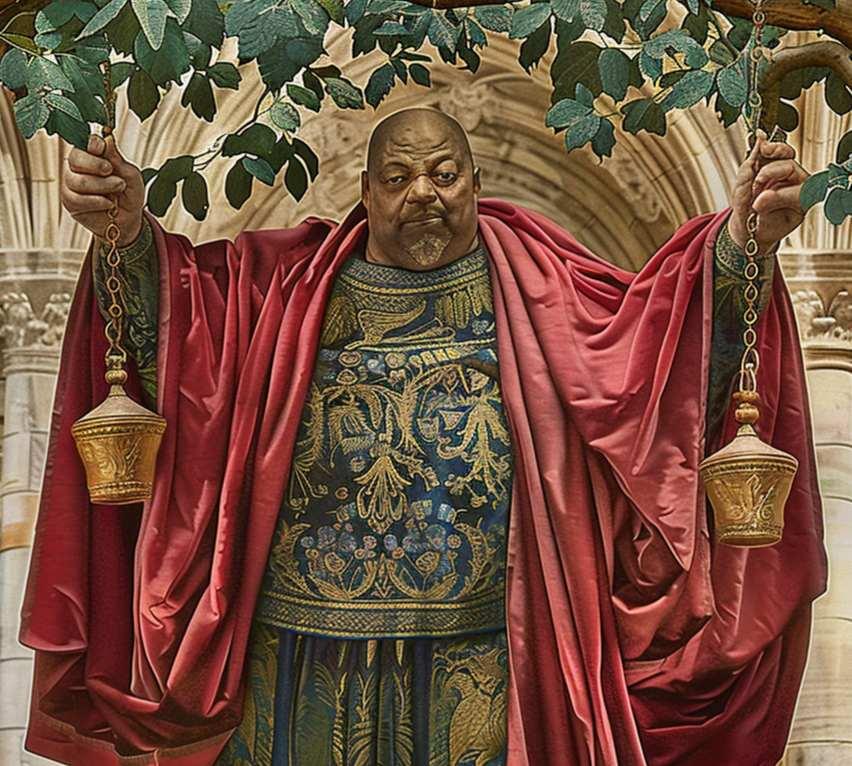
“Brother Bartolo!” Truella finished for him in a whisper. “Why is there an ancient tapestry of him, with all those frog faced nuns?”
Rufus felt dizzy and clutched the bannisters to steady himself. It was all coming back to him in a rush: images and sounds crowded his mind, malodorous wafts assailed his nostrils.
“Why, whatever is the matter? You look like you’ve seen a ghost. Come, come and sit down in my room.”
“Don’t you remember?” Rufus asked, with a note of desperation in his voice. “You remember now, don’t you?”
“Come,” Truella insisted, tugging his arm. “Not here on the stairs.”
Rufus allowed Truella to lead him to her room, rubbing a hand over his eyes. He was so damn hot in this leather coat. The memories had first chilled him to the bone, and then a prickly sweat broke out.
Leading him into her room, Truella closed and locked the door behind them. “You look so hot,” she said softly and reached up to slide the heavy coat from his shoulders. They were close now, very close. “Take it off, darling, take it all off. We can talk later.”
Rufus didn’t wait to be asked twice. He slipped out of his clothes quickly as Truella’s dress fell to the floor. She bent down to remove her undergarments, and raised her head slowly. She gasped, not once but twice, the second time when her eyes were level with his manly chest. The Punic frog amulet! It was identical to the one she had found in her dig.
A terrible thought crossed her mind. Had he stolen it? Or were there two of them? Were they connected to the frog faced sisters? But she would think about all that later.
“Darling,” she breathed, “It’s been so long….”
Whether or not Truella’s suggestion proved to be true or not, and time would tell, she couldn’t help wondering about the letter Malove had sent to Jeezel. Was it genuine? Had she, Truella, also received one? Jeezel had asked if she’d checked her bags, and the truth was that she had not.
She made her way slowly up the grand staircase, holding the banister to steady herself as she looked at all the tapestries. How strange they were, a series of smaller cloths all of a similar theme, all of corpulent nuns in crimson red robes, not in itself a strange thing in an old convent, but they all had the faces of frogs.
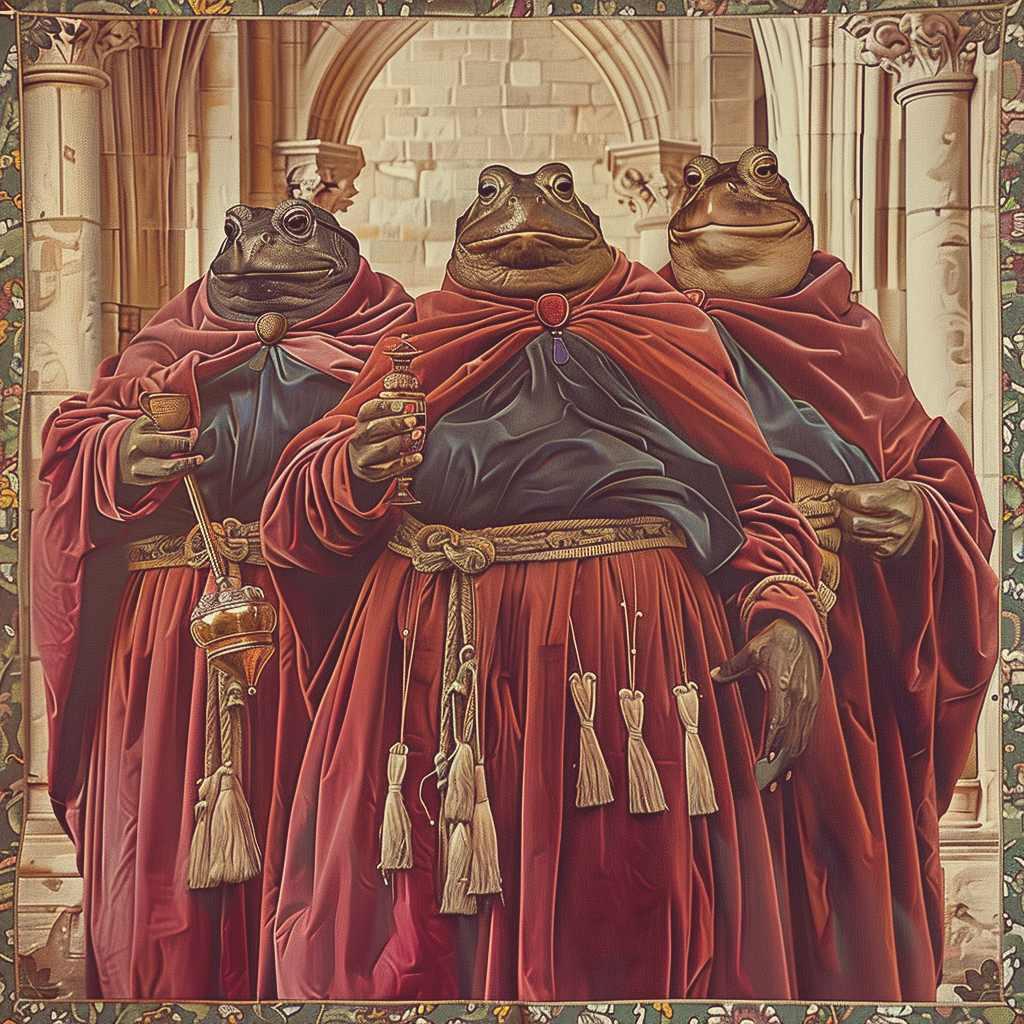
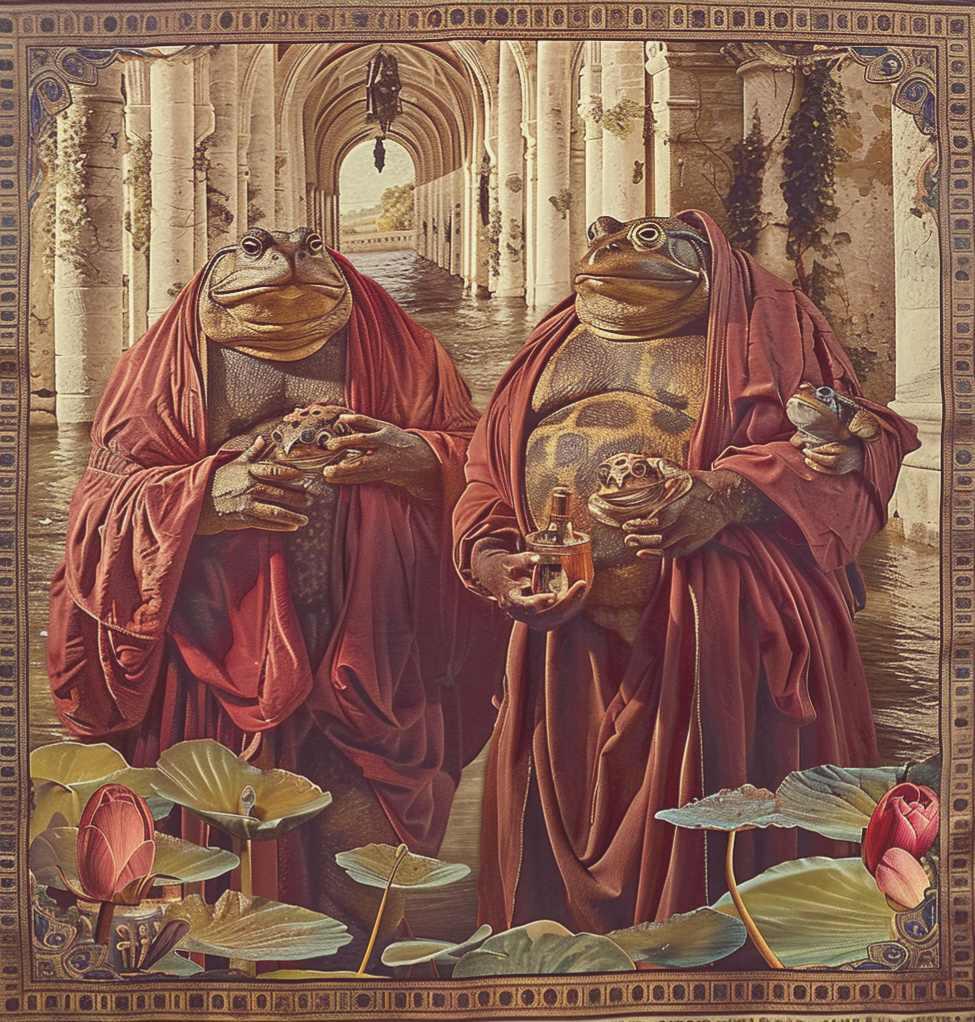

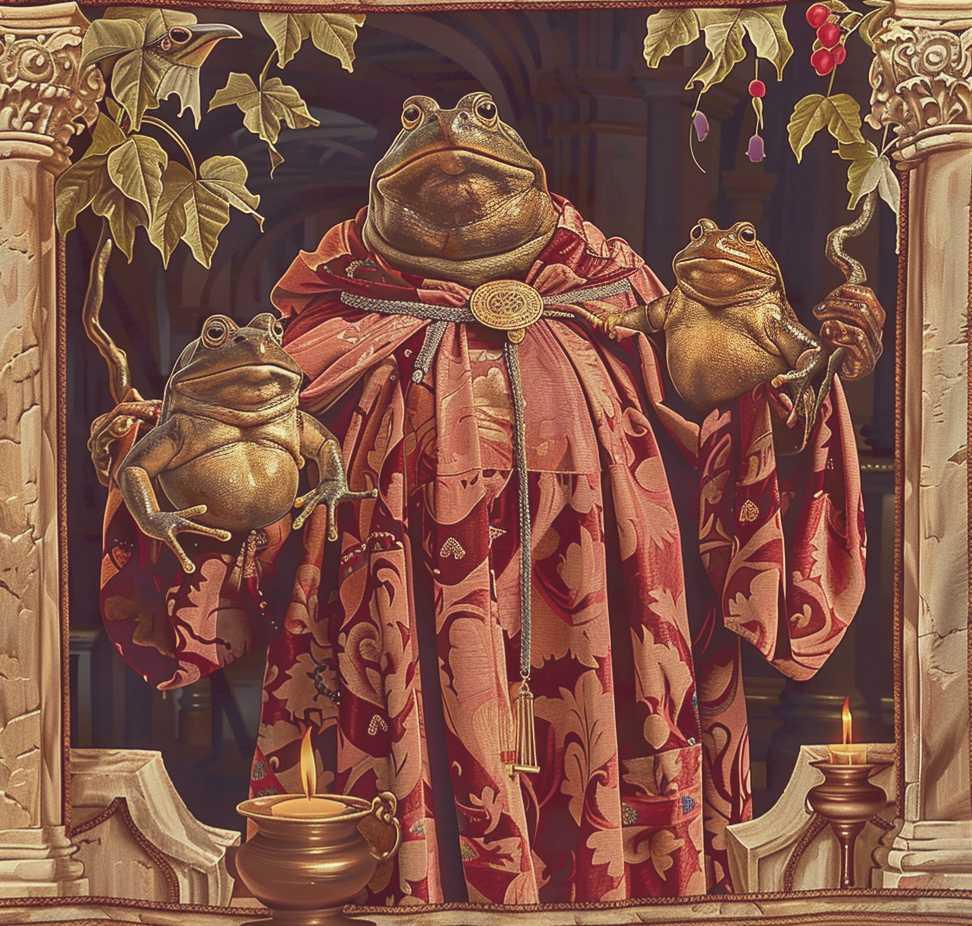
“I see you’ve noticed them too, Truella,” Rufus said quietly, his hand reaching under his shirt for a moment.
“Thank goodness I was holding onto the bannisters, you startled me! I didn’t see you there. I could have fallen to my death on the tiled floor below, Rufus.”
“I’d have saved you. As I always have done,” He replied enigmatically. “Do you recognise them now?” he asked, glancing pointedly at the embroidered cloths.
Truella paused. What was going on here? Was he trying to distract her? “Rufus, we need to talk,” she said quietly. “I’m going to my room to look for, er, something. Come with me.”
“If you ask me,” said Trella, although nobody had, “If anyone wants the merger to fail, it’ll be someone from the Cloisters.”
“Seems like none of us want it, why single them out?” asked Frella. “Well,” she added, glancing at Eris, “Not all of us maybe but for most of us it’s just a hassle. Just more work, and no real benefits for the likes of us, anyway.”
“Think about it, Frell. Sure, it’s just a nuisance for the witches and the nuns, but not enough of a bother to play with fire meddling with far grander schemes. That’d be way out of the depth of most of us, I’m sure. But there’s more going on at the Cloisters than meets the eye. There are other, er, things here, things that don’t want change.”
“Like what?” asked Eris in a doubtful tone.
“I don’t know but I can feel it. Can’t you? Eris, you’re so busy looking at spread sheets and finances you are losing your second sight! The undercurrents are bubbling up so much we’ll drown before long! We’re all looking at each other with suspicion, and meanwhile….”
“You mean we can trust the Morticians?” asked Jeezel hopefully. Eris glared at her.
“Maybe,” Trella said. “Maybe. We don’t know anything for sure yet. But I suggest we stop looking at the nuns, I mean the ordinary rank and file nuns, and the morticians with suspicion and focus on the place itself. There’s a long dark history to this place. And if you ask me, Brother Bartolo knows something.”
“Surely he’s not behind the whole thing!”
“Not behind the whole thing, no, but he knows something. And the gardener, Brother Babbit. Sassafras told me there’s nothing Brother Babbit doesn’t know about the history of this place, but that he only wants to talk about the plants, you know, the local wildlife and such. And,” Truella paused dramatically, “Sandra dropped something out while we were smoking weed in the orchard after the reception. She said Brother Bartolo said he’d seen the Sisters of the Sacred Sepulchre roaming around in the cellar, waiting for orders!”
“The sisters of the friggen what?” Jeezel sighed. Not more characters to convolute everything even more! “Roaming around in the cellars? Oh come on!”
“And that’s not all,” Truella lowered her voice to a whisper. “Sassafras said something about them being reanimated.”
Finally, Eris started taking Truella seriously. “Reanimation? I don’t like the sound of that. We’d better find out as much as we can about the sisters of the cellars, who are they, I mean who were they, have they been reanimated before, and what were the circumstances.”
“Right ho, I’ll just boogle it, shall I?” Jeezel said sarcastically.
Eris rolled her eyes. “No need for the snark. The clues will be here, right here at the Cloisters. We need to check the library, look in every room for clues, check out all the tapestries and paintings, speak to Brother Bartolo and Brother Babbit, but without making them suspicious, mind! Just pretend an interest in history, no mention of the merger! Keep it light! And keep it light with the morticians, but keep it superficial, until we know more. And then…,” Eris looked at each of them. “we need to go down to the cellars. I suggest we do that together.”
“We need Frella to come for that,” Truella stated the obvious. The others murmured their agreement.
Rufus was not a man for small talk and the past couple of hours had been punishing for a man of his reticent character. He would have liked to get to know Truella better to try and recall which life he’d known her in, for he was sure now that it wasn’t a past encounter in this one, but that was not something to discuss in a crowded room. It would have to wait. Despite being a serious man himself, he had found the more frivolous and jolly witches and nuns more compatible than the severe looking grim ones. Even so, having to meet and speak to so many people in such a short time was overwhelming.
As soon as he could politely do so, he excused himself. Avoiding the smoky courtyard, he wandered around the labyrinthine building looking for another way outside. There were tapestries hanging on the walls in every room, ancient and faded, many with unusual designs. Rufus photographed them all in order to have a closer look at them later in the solitude of his room. The wall hanging with the frogs caught his eye in particular, and without thinking he found himself touching the Punic frog amulet hanging on his chest underneath his white silk shirt. As he lingered looking at the frog tapestry, he was startled by the swish of Bartolo’s robes behind him. Bartolo looked at him keenly for what seemed like an interminable length of time but in reality was only a moment. Damn it, he seemed familiar too.
“Exquisite decor, Brother, I like this one in particular. Such needlework! May I ask the provenance of this specimen?” Rufus tried to lighten the mood, not that lightening the mood had ever been his strong suit. “It looks very old, I assume this is not a recently made handicraft?”
Brother Bartolo decided to play along. He had recognised Rufus immediately, as if the name wasn’t enough of a clue, his eyes were exactly the same as old Rufino’s had been. Rufino, one of the oldest Punic families in Baetica. Oh, Bartolo remembered them well.
“That one has been hanging here since well before the convent was built,” Bartolo explained. “It happens to be one of my favourites. Another glass of cordial, sir?”
“No thank you Brother, I need some fresh air. I’d like to see the gardens, if I may.”
“Follow me,” replied Bartolo, as he lumbered down the passage. “The kitchen gardens are through here. There’s a gate at the end of that path to the rest of the grounds. Don’t worry about the mongoose, they’re quite tame.”
Such was the relief to be outside on his own, that Rufus didn’t immediately wonder what Brother Bartolo had meant. That frog tapestry had been hanging right there since before the convent was built? Hanging on what? Rufus’s hand involuntarily clutched his amulet again.
After an eternity of cordial superficial conversation with a vertitable horde of new characters, and despite that some of them seemed either potentially interesting, possibly entertaining, or just downright intriguingly bizarre, Truella badly needed a quiet moment to herself, or in other words, a cigarette. Excusing herself from a strained attempt at getting to know a prim thin lipped nun whose name escaped her, Truella made her way over to the cloisters beyond the open doors. The courtyard beckoned, a breath of fresh air and a peaceful respite.
Leaning against a pillar, Truella took a drag on her cigarette, exhaling long and slowly. Perhaps it was just the shafts of sunlight making it seem that there was so much smoke. It hadn’t been too bad, after all. What an assorted bag they all were! Truella hadn’t given any thought to what all these new people she was to merge with would be like ~ she’d been focused on the intrusion into her own pursuits that such a thing would inevitably entail.
Rufus seemed to be keeping his distance, but Truella was relishing it, like knowing there’s cheesecake in the fridge for a midnight snack. Surprisingly, the two nuns Sandra and Sassafras seemed like good eggs underneath those dreadful habits. Truella was glad that Sassafras was her partner for the ritual; certainly it would have been worse with one of those silent ones. She wondered if Sassafras had anything planned, and if she should have thought about the ritual sooner. But then, how could she have known? The assumption had been that the partners would meet, and then come up with something together. Wasn’t it just a fun getting to know each other game kind of thing?
“How many cigarettes are you smoking out here?” Sandra laughed, “Can’t say I blame you though, gawd, will it never end.” Coughing, she lit a cigarette. “What is it you’re smoking anyway? What a funny smell, like the bowels of the earth.”
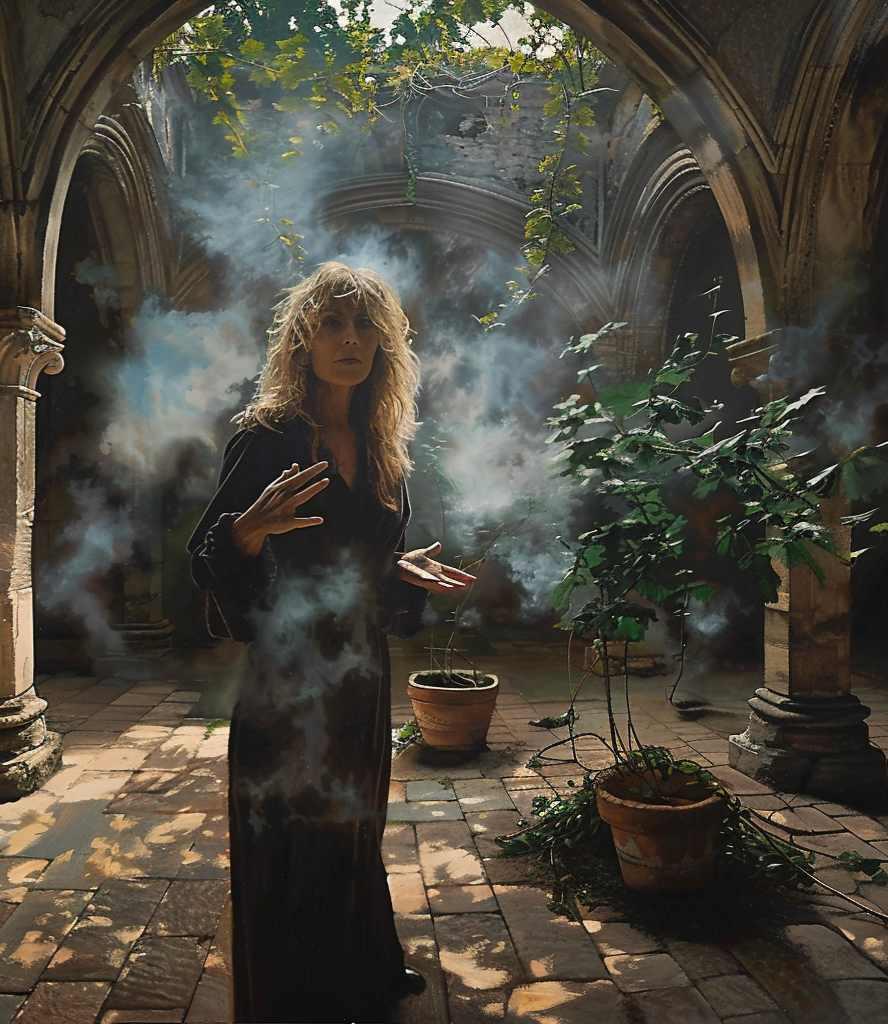
Truella thought this was rather rude, but had to admit that the smoke did smell peculiar. “That’s exactly what it smells like. And that smoke isn’t from my cigarette.”
“Fee Fi Finnley Fum, I smell the smoke of a dragon’s bum,” Sandra tried to laugh and failed. “Oh, heck. I don’t like dragons.”
“Neither do I,” Truella didn’t like the sound of this at all, but it had given her an idea for her ritual.
Equally, Eris could have associated the play dragging on with a get your drag on, and thrown a party. In another possible dimension, she probably did.
“It’s your fault I’m late, Sandra!” Sassafras hissed, adjusting her wimple and throwing a large crucifix around her neck. “You told me it was witches costumes, I had to run back upstairs to change.” Missing a step as she rushed down the stairs, Sassafras grabbed the bannister, managing to save herself from a possibly fatal tumble down to the tiled floor below.
“I thought it was! That’s why I’m late too. And anyway you look half witch and half nun in that outfit.” Sandra gripped Sassafras’s wrist. “Ok, calm down and deep breaths. Demure and collected, remember? We need to look serious and efficient.”
When they reached the door of the grand reception hall, they stood aside to allow Brother Bartolo to pass, on his way to the kitchen for more refreshments. He allowed himself a small smile, holding up an empty decanter. “Crimson Cordial, that’s what she told me to give them. It’s not every day she gives me the key for the cordials cabinet.”
“Not the Crimson Cordial!” the girls gasped in unison. They looked at each other, perplexed. “What is she playing at, Brother?”
“That’s not all,” whispered Brother Bartolo, leaning closer to Sandra, “She’s re animated the Sisters of the Sacred Sepulchre from the crypt. I’ve seen them wandering around in the cellars, waiting for orders.”
Sandra and Sassafras looked at each other in alarm. “This is serious.”
“But is it to assist the merger or derail it?”
“Who only knows what goes on behind that prune faced scowl. And why has she invited a team of morticians, eh? Ask yourself that! Morticians!” Sandra said.
“This is too dark for me, I’m off. Tell them I’ve been taken ill, I’m going for a walk in the woods.”
Brother Bartolo barred her way. “Oh no you’re not. You won’t get away with that this time,” he said grimly. “This is too dark for those petty tricks. And you may be needed,” he added cryptically. “All hands on deck, and as many fingers as you like.”
“Welcome to The Cloisters, everyone! Please, make yourselves comfortable, our girls will be with you shortly. Ah, here’s Brother Bartolo with refreshments.” And with that, Lorena turned on her heel and clacked noisily off down the corridor in search of the nuns. How appallingly rude of them all to be late for the reception!


Adjusting the crimson silk handkerchief in his breast pocket, Garrett swanned into the reception hall, his piercing pale blue eyes scanning the room. The walls were hung with colourful but faded tapestries, shabby enough to be genuinely ancient. The furniture was heavy and blackened with age, but it was the floor that caught his critical eye. In the centre of the old terracotta tiles floor was a mosaic, mostly hidden under a large conference table. Garret was no expert on Roman mosaics but it looked like the real deal. He would return to this room later for a closer inspection, he could hardly go crawling under the table now. It was a mercy, at least, that the ancient building hadn’t been decked out in ghastly modern furnishings as so many charming old hotels were these days.
He turned his attention to the few occupants. A ravishing raven haired beauty had just wafted in from the covered cloister beyond the open doors. Her silver mantilla shone in the sunlight slanting down into the courtyard for a moment, for all the world looking like an angelic medieval halo. As she slippped into the shadows the halo vanished, her ebony tresses showing beneath the gauzy lace. She settled herself in a low armchair, smoothing the burgundy folds of her gown. Garrett watched, spellbound. What an enchantress! Perhaps this weekend wouldn’t be such a bore, after all.
Despite her initial misgivings, Truella was looking forward to the weekend at the Cloisters. It had belatedly come to her attention that another group were joining them for the event, the Mortician’s Guild. She wondered if Austreberthe had bitten off more than she could chew, introducing all these new characters at the same time. But the more people, the more confusion, the better the opportunities to slip off unnoticed and investigate the grounds.
Truella was the first to arrive. Before entering the building, she paused under the shade of a towering eucalyptus tree, taking it all in, receptive to the ancient whispers calling from the surrounding forrest. A nightingale beckoned from the trees beyond one of the terraces, and Truella was irresistably drawn towards it. Crunching softly on the crisp dry leaves underfoot and squinting in the bright sunlight, a flash of movement caught her eye. Was it a bear in the woods? Surely not, not so close to habitation. Truella inched closer, curious, her muscles tense, keyed in readiness to flee. But she was overdramatising, and made a little self deprecating snort of mirth.
The tall man clad in a floor length leather coat heard a snort and paused, wondering how close the wild boar came to the old building. Surely they kept away from people, people were so dangerous. Pull yourself together, Rufus, old boy, he said to himself. Why did this place remind him of… well it was no good harking back to that…maybe he should go back inside. He threw his broad shoulders back and strode out from the cover of the trees, the hem of his coat gathering prickly seeds from the undergrowth.
Truella clapped her hands delightedly, and laughed. “Well look at you, you big bear in the woods, you must be one of the guys from the Mortician’s Guild.”
Rufus spun round, his duster coat flaring open to reveal the crimson satin lining, his face a picture of moody glowering. Truella was momentarily nonplussed. Handsome guy, but what an attitude. But maybe she should not judge too quickly, after all, he probably resented having to come here. Maybe she could soften him up over the course of the weekend.
“We may as well go in and meet the others. I’m Truella, pleased to meet you,” she said, offering a hand in greeting. To her surpise, than man took her hand and kissed it. “Rufus, at your service,” he said with a slight bow. He peered at her and added, “Have we met before? You seem strangely familiar.”
“Why yes, so do you!” He didn’t, but Truella’s hand was tingling warmly from the kiss and she decided to play along.

The Morticians Guild:
Nemo Tenebris, and let me tell ya, he’s a character straight out of one of those dark romance novels. Tall, brooding, with tousled hair somewhere between charcoal and mahogany, he’s got that rugged charm that makes even the bravest witches’ hearts skip a beat. His hands are like an artist’s, always deliberate and precise, whether he’s handling ancient texts or, well, more corporeal tasks. His personality? Think intense and enigmatic, with occasional bursts of biting humor. He’s the type who’ll share a grim tale and then light the room with a grin that makes you question your reality. Don’t underestimate him – he’s a master of necromancy and has an uncanny sensitivity to life’s deepest mysteries.
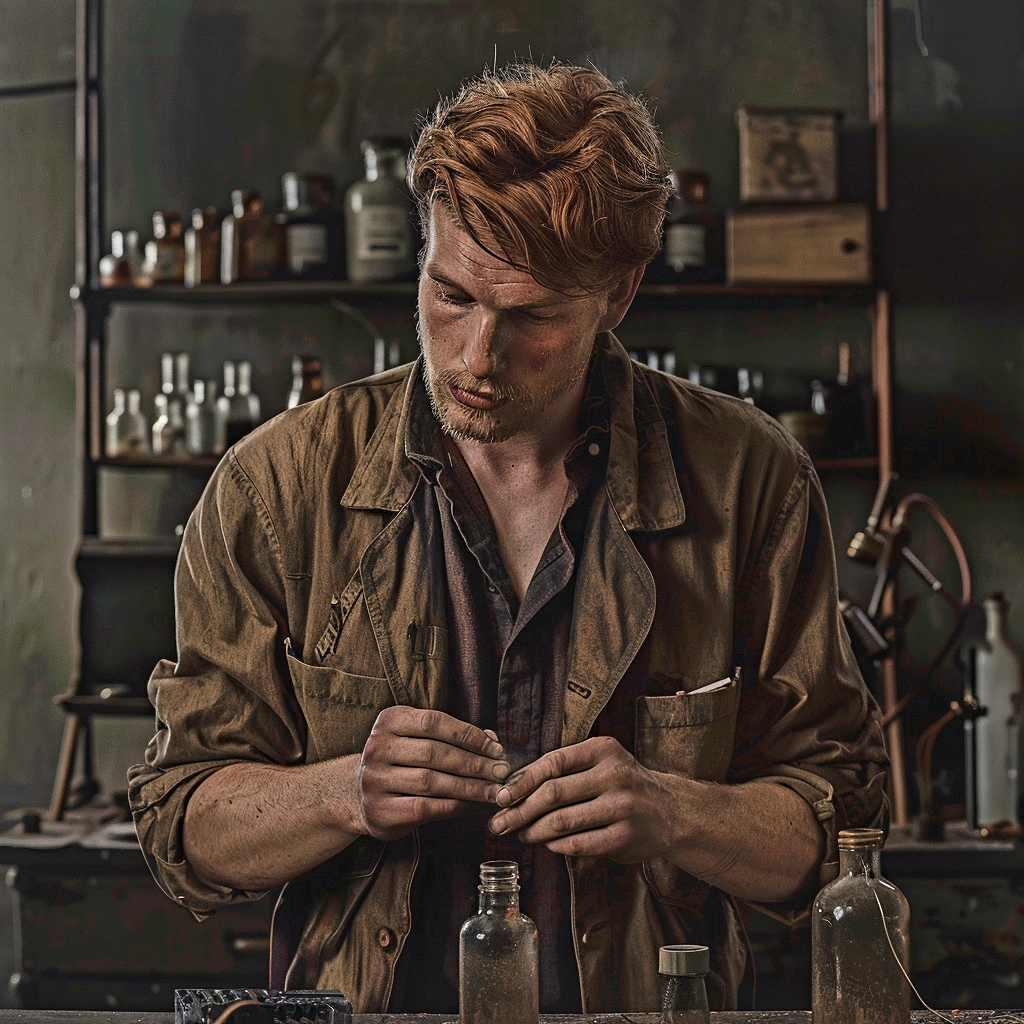
Silas Gravewalker. An older gent, he looks as though he’s always expecting a foggy night – grey cloak, even greyer hair, and eyes the color of storm clouds. His demeanor is gentle but don’t mistake it for weakness. He’s the wise old guardian of the Guild, carrying centuries of rituals, chants, and incantations within him. Silas is a remarkable blend of grandfatherly wisdom and hidden strength, and he’s a calming presence in the midst of chaos. His sense of humor is dryer than the Outback in summer, subtle yet striking at just the right moments. When Silas speaks, you listen, because his words are often tinged with layers of arcane meaning.

Rufus Blackwood: Enter Rufus Blackwood, the stoic guardian of the guild. He’s tall and broad-shouldered, with a presence that commands both respect and a shiver down the spine. His hair is a dusty shade of midnight black, streaked with the occasional silver – probably from the weight of the secrets he carries. His eyes are a pale grey, like the fog rolling off a moor, always scanning, always measuring. He’s perpetually clad in a long, leather duster coat that sweeps the floor as he glides across the room.
Personality-wise, Rufus is the strong, silent type, but when he speaks, it feels like ancient tombs whispering forgotten wisdom. He’s got a dry humor that surfaces in the most unexpected moments, like a ray of moonlight in a pitch-black night. He’s fiercely protective of his coven and guildmates, and there’s a sense of old-world honor about him. Underneath that granite exterior is a surprisingly tender heart that only a select few have glimpsed.

Garrett Ashford: Now, Garrett Ashford, he’s a bit of a dandy, as far as morticians go. Picture a man of average height but with presence larger than life. His hair is a striking ash blonde, always perfectly coiffed, and his attire is meticulously sharp – tailored suits, often in dark, rich fabrics with just a hint of eccentricity, like a red silk handkerchief or a silver pocket watch. His eyes are a sharp, pale blue, twinkling with a touch of playful mischief.
Garrett’s got a personality as polished as his appearance. He’s charismatic, with a knack for easing tensions with a well-timed joke or a charming smile. Though he might come off as a bit of a showman, make no mistake – Garrett’s got depth and a sharp mind. He’s a skilled embalmer and incantation master, knowing just the right touch to handle even the most delicate of cases. His flair for the dramatic doesn’t overshadow his competence; it complements it. He’s the kind of bloke who can discuss the darkest of topics with a light-hearted grace, making him a bit of a paradox but undeniably captivating.

Sandra finished her toast, pushed her plate away and stood up. She wiped her hands on the seat of her baggy linen trousers, and then retied the baler twine holding them up. So Blaen the pain thought she should improve her appearance, did she, the prune-faced troll. Sandra was quite happy with her own appearance, which she considered to be a statement indicating her lack of interest in appearance. Lorena Blaen glared at her retreating back as Sandra exited the dining hall with the exaggerated gait of a catwalk model.
Sassafras quickly swallowed the rest of her coffee, and got up to follow Sandra. Catching her up along the cloisters, she asked Sandra if it was a nun’s outfit event or a witches one, or what. It was hard to keep track of the various fronts.
“It’s a witches one this time, it’s a coven visiting. They know we use the nun thing as a cover, I think. But you know what else?” Sandra lowered her voice, pulling Sassafras closer. “This isn’t a merger, that coven already bought us out.”
“What?! But…but…but what does that…?”
Sandra shrugged, looking uncharacteristically helpless.
Sassafras squeezed her arm. “Who else knows? We must tell the others.”
“No! No, not everyone.” Sandra admitted that she didn’t know any more than that, and what she did know, she couldn’t say.
Penelope Pomfrett: Let’s start with Penelope, shall we? She’s a statuesque woman with a sharp, angular face that could cut through butter – not unlike an Egon Schiele painting, if you’re familiar. Her hair’s a spun silver waterfall, always meticulously pinned up but with just a touch of wildness trying to escape, like she’s taming a tempest on top of her head. Her eyes are a piercing cerulean blue, always calculating, always observing; she’s the type who looks right through you and into your deepest secrets.
Personality-wise, Penelope’s got the demeanor of a headmistress crossed with a lioness. She’s precise, a bit of a perfectionist, never suffers fools gladly. But beneath that stern exterior, she’s got a heart of gold, especially when it comes to her coven sisters. Stern loyalty and high standards, that’s her in a nutshell. And she’s got this dry wit that’ll catch you off guard and have you chuckling before you know it.
Sandra Salt: Now Sandra, she’s a different kettle of fish altogether. Think earthy, grounded; she’s got that warm, approachable vibe that’s almost tangible. Picture her with curly auburn hair, always escaping its braids to frame her face in a halo of fiery ringlets. She’s got freckles smattered across her sun-kissed cheeks and a smile that feels like coming home after a long journey. Eyes? Warm hazel, like caramel with a hint of green, always twinkling with some hidden mischief or gentle wisdom.
Sandra’s personality is as grounded as the soil she loves to dig her fingers into; she’s the heart and soul of the crew, with an infectious laugh that could light up the darkest of days. She’s nurturing, perceptive, and has an uncanny knack for making everyone feel at ease. But don’t mistake her kindness for softness – she’s got a spine of steel and can summon a fierce storm if she’s wronged.
Audrey Ambrose: Now, dear Audrey, she’s a bit of a mysterious beauty. Think raven-black hair that falls in silky waves down her back, always perfectly styled without a hair out of place. She’s got porcelain skin, smooth and almost ethereal, like moonlight itself took her under its wing. Her eyes are a deep, striking emerald, always seeming to know more than she lets on. Add to that a penchant for elegant, vintage clothing, and you’ve got yourself a picture of classic, timeless beauty.
In terms of personality, Audrey’s a quiet storm. She’s enigmatic, often found lost in thought, with a deep, contemplative nature. While she may come off as aloof, she’s deeply empathetic and has an old-soul wisdom that guides her every action. She’s the sort you turn to when you need profound insight or a steady hand in times of chaos. And that wit – it’s as sharp as her fashion sense, subtle, and spot-on.
Sassafras Bentley: Lastly, let’s paint a picture of Sassafras. She’s vibrant and flamboyant, tall, thin and athletic, with hair dyed in shades of a peacock’s feathers – blues, greens, purples – ever changing with her whims. Her outfits are always eclectic and bold, but practical. She’s got a long hatchet face, and eyes that are a sparking topaz, full of zest and life ~ and secret undercurrents.
Sassafras is the party animal of the lot, always bringing fun and chaos in equal measure. She’s got a joie de vivre that’s downright infectious, a real firecracker with boundless energy. Her natural charisma draws people in, and her laugh – oh, her laugh! – it’s the kind of sound that warms the soul and invites everyone to join in her revelries, unless she’s being rude, aloof and secretive. Underneath all that sparkle, though, she’s fiercely protective of those she loves and more insightful than she lets on.
Lorena Blaen clapped her hands loudly together. Sassafras ignored her and continued buttering her toast, assuming that her boss was calling the stray dogs in to finish off the breakfast leftovers.
“Now then, girls!” Lorena’s strident voice boomed out. Sassafras sighed and looked up, her knife poised in the air. A blob of butter slid off onto the table.
“As you know, four members of the Quadrivium will be joining us this weekend and I have assigned a guide to each of them. One of them, however, will not be able to attend in person as she is occupied on an important case, but her guide will be in remote communication with her for the duration of the weekend gathering.”
The witches in the breakfast room collectively held their breath, many of them secretly concocting mental repellent spells so that they could avoid being chosen for this tedious assignment.
“And no need to try that with me, I have already disabled any attempts to divert my intentions,” Lorena said, glaring pointedly at a few individuals. “Sassafras, your assigned guest for the weekend will be…” Lorena looked at her notes, “Truella. Penelope Pomfrett, yours will be Eris.”
Penelope sighed loudly and slammed her coffee cup down harder than she intended, making Sassafras giggle.
“Sandra Salt, I hope you will be able to take this assignment more seriously than some of your colleagues. You will be attending to…” Lorena glanced at her notes again, “Jeezel. And by the way Sandra, perhaps you can learn a thing or two about the importance of appearance from Jeezel,” she added, with a critical look at Sandra’s sloppy attire.
“Audrey Ambrose,” Lorena announced, glaring over the top of her spectacles at Audrey whose mouth had dropped open in astonishment, “You’ll be quite capable with your broken ankle to attend to Frella remotely.” Audrey’s mouth snapped shut into a grim line. Her plan of faking an injury to avoid duties for a few weeks had backfired. And the cast was hot and itchy, and all for nothing.
“Our guests will be arriving later this morning. You will be expected to entertain them within the monastery buildings and grounds, but under no circumstances are you to leave the grounds or go into the woods.”
Sassafras raised an eyebrow but was careful to not let Lorena see. Her immediate idea was to go into the woods with what’s her name, Truella, and lose her for the day, maybe find her in time to bring her back for supper.
What the disgruntled witches of the Quadrivium hadn’t considered was that the witches of the Quintessivium Cloister Crafts weren’t happy about the merger either. They were not happy with their leader either, but had progressed towards a takeover considerably more than the floundering dissatisfied Quadrivium members. A gaggle of strangers about the place, and the attention of the supervisors during the process of merging, was the last thing they needed at this delicate stage. Sassafras Bentley in particular was worried, more alarmed than the others, for she had another secret investigation under way as well as the revolt.
Sassafras hadn’t been sleeping well. Not only did she have to cover her tracks from the others and the administration, she now had to ensure none of the nosy witches from the other coven chanced on her preliminary findings. It had taken so long to get to this stage, and she was at a crucial point of revelation. But not only did Sassafras have to maintain the utmost secrecy, she had to get her colleagues to help her conceal it ~ but without telling them what it was or why they had to keep it quiet.
It would help if there was someone she could trust to help her. But who? The other witches were a dizzy shallow lot, more interested in showy spells and those tawdry crafts and sales. The only reason they’d been moved to start a rebellion was because they wanted a bigger slice of the pie: too much was being creamed off by the top brass, and they wanted more attention for themselves, too. The fact of the matter was that Sassafras had only joined the coven because of the location of the headquarters. True, she had dabbled in witchcraft, cast a few spells, but in her own way. She didn’t naturally gravitate to team work with all its problems ~ not least, all the other people that one had to put up with. But it was an extremely useful way for her to fully explore the location, and gave her many opportunities to walk on her own in the woods, ostensibly gathering plants for the spells and potions.
A group from the Quadrivium were expected to come and stay over the weekend. Sassafras didn’t have much time to hatch a plan, but the urgency was clouding her brain, rendering her incapable of thinking clearly. It was an interruption. She needed ~ and wanted ~ to think about the discoveries, not worry about this unsettling development. Maybe she would just have to play it by ear when they came.
When Truella had stopped reacting, she had another look over the memo, noticing the location of the preposterous sounding coven they were to associate with. She had assumed that it would be in the north, or at least in Madrid, but was astonished to discover they were based very close to her village. She wondered why she had never heard of them. She supposed that they did their money minded business elsewhere and were merely based here, hidden in the cork woods, masquerading as one of those ghastly upmarket hotels for corrupt politicians. One could only see the distinctive tower from the roads, as the old convent was hidden deep in the woods. Nobody Truella knew had ever had any money to get through the gates and have a closer look.
This gave Truella an idea. What an opportunity! It would give her a way in.
Actually, I think it might be a great idea, girls. Let’s give it our best shot. Austreberthe has my support on this.
Eris, Frella and Zez nearly dropped their gadgets when they read Truella’s latest message. Frella was the first to respond.
Go on then, tell us. What changed your mind?
Location, location, location! Truella replied. Check out where they’re based!
After a few minutes, Frella replied.
You better spill the beans and tell us what you’re planning. That is, if you want us to cooperate with you and go along with this latest trashy money grabbing fiasco in the making. I thought our plan was to have the summer off? What does the location mean to you?
Speak for yourself, Frella, Eris replied, rather miffed. At least she’s going to go along with it, for Flove’s sake, let’s just do what we’ve been asked to do without complaining for once!
I’m with you, Eris, Jeezel piped up, I quite fancy a flamenco puffer jacket. Or a nice knitted sombrero. And we can visit Truella while we’re there on business.
Outnumbered, Frella sighed. I still think Truella should explain. Explain fully. And don’t expect me anytime soon, either. I have to solve the mystery of the camphor chest first.
-
AuthorReplies